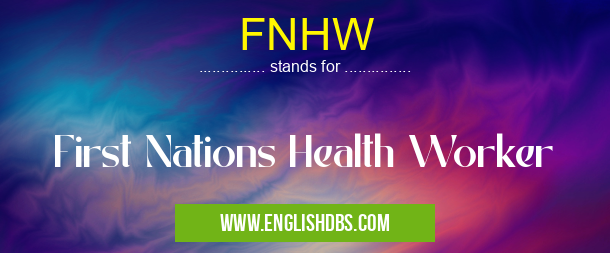What does FNHW mean in HEALTHCARE
FNHW stands for First Nations Health Worker. It is a term used within the healthcare industry to identify the person responsible for providing healthcare services to members of a First Nations community. FNHWs provide care that is culturally appropriate, backed by evidence-based practices, and attuned to the needs and beliefs of their patients. The role of an FNHW is varied and may involve advanced clinical practices such as mental health counseling or public health education. FNHWs are important members of any healthcare team working in First Nation communities or with Indigenous people across Canada.

FNHW meaning in Healthcare in Medical
FNHW mostly used in an acronym Healthcare in Category Medical that means First Nations Health Worker
Shorthand: FNHW,
Full Form: First Nations Health Worker
For more information of "First Nations Health Worker", see the section below.
» Medical » Healthcare
Essential Questions and Answers on First Nations Health Worker in "MEDICAL»HEALTHCARE"
What is a First Nations Health Worker?
A First Nations Health Worker is a professional who provides health care and support to individuals in Indigenous communities. They are responsible for delivering public and community health services, promoting healthy lifestyles, educating people about health and wellness, and advocating on behalf of patients.
What qualifications do First Nations Health Workers need?
Most First Nations Health Workers must hold a Bachelor's degree in a related field such as health promotion, public health or community health. Some positions may also require additional certifications depending on the specific role.
What kinds of tasks do First Nations Health Workers perform?
The tasks they engage in can vary widely depending on their job role. This could include facilitating access to medical services, helping to create healthier environments at work and home, researching health issues affecting Indigenous populations, developing education materials, collecting data or providing counseling support to families.
What traits make someone successful as a First Nations Health Worker?
Successful first nations health workers must be passionate about improving the wellbeing of their clients. They must also be patient, organized, detail-oriented, communicative and have strong negotiation skills. In addition, they should possess excellent problem solving abilities to respond quickly and effectively to the needs of those they serve.
How can First Nation Health Workers help promote good health practices?
Through educational programs or initiatives that emphasize healthy lifestyle choices like proper nutrition and physical activity. Community outreach can also be beneficial whereby a health worker visits homes or schools to teach people about the importance of reducing risk factors associated with chronic conditions such as diabetes or heart disease. Furthermore, they strive to find innovative solutions tailored to the specific needs of each client in order to improve overall quality of life within their community.
What challenges might a First Nations Health Worker face?
Many Indigenous communities have limited access to medical care due its remote location or lack of resources available for treatment. Additionally, there may be cultural differences between traditional practices and modern healthcare which can lead some people resist engaging with medical services offered by non-Indigenous professionals. Language barriers or other communication difficulties may also present unique challenges when working with patients from different backgrounds.
Why is it important for First Nations people to have dedicated healthcare professionals?
Having dedicated healthcare professionals who understand the culture of Indigenous peoples can make it easier for individuals in these communities to access quality healthcare services that are tailored to meet their unique needs. In addition, having professionals who understand the language and cultural intricacies makes it more likely that any medical advice given will be better received.
How does working as a First Nations Health Worker benefit society as whole?
By providing high-quality healthcare services tailored towards indigenous communities this helps ensure vulnerable populations receive equitable access the same level of care afforded other Canadians. This helps improve overall public health outcomes which benefits all members of society - regardless of background.
Final Words:
In conclusion, an FNHW plays an important role in ensuring that members of Indigenous communities receive quality primary care that meets their unique physical, mental and spiritual needs in accordance with cultural values rooted within ancestral tradition. FNHWs must possess excellent communication skills, empathy towards their patients’ well-being and a desire to help create pathways leading toward improved access to healthcare resources specifically designed for the benefit of all First Nations people regardless of geographical boundaries.
